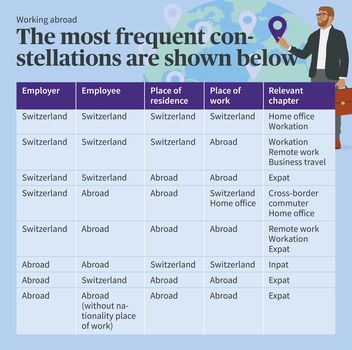
Working abroad: here’s what to bear in mind
The world of work has changed and work no longer has to be carried out in the office. This opens up new opportunities for employees and companies to attract talent and retain experienced employees. The legal conditions and challenges of new work models and workplaces are equally varied.
This article gives you an insight into the requirements for working abroad and explains what challenges employees and companies face. We also show you options for organizing occupational benefits insurance for your employees to ensure compliance with legal provisions and internal guidelines for your company and your employees.
What are the requirements for working abroad?
The answer to this question depends on many factors, such as the country in which the employed person will work, their nationality , the country in which the employer’s head office is based or which data is processed and how long working abroad will last.
Depending on the arrangement, this has consequences for tax and social insurance. To avoid nasty surprises for employers and employees, it’s a good idea to clarify a few questions first.
Which personnel matters should be borne in mind?
The following should be considered: the employed person’s work permit , the legal basis of the employment contract and the employer’s head office.
The most common scenario is a company in Switzerland employing a Swiss national or a person with a C residence permit with a Swiss employment contract. The second most common involves foreign nationals who have a Swiss work permit and are resident in Switzerland, and the third involves cross-border workers.
Another possibility involves people who are sent to work abroad by a Swiss company, referred to as expats. The foreign assignment can either be at a company’s foreign branch or at a customer’s premises.

What applies to cross-border workers?
When it comes to cross-border workers, a distinction must be made between people with an EU/EFTA nationality and those with a third-country nationality.
EU/EFTA countries
Cross-border workers from EU/EFTA countries can be granted a cross-border worker permit if they meet the following criteria:
- Residence in an EU/EFTA country
- Employed by a Swiss employer with a Swiss employment contract
- Returns at least once a week to their main residence outside of Switzerland
- Employment activity is more than 90 days in a calendar year
Third countries
If a cross-border worker is a national from a third country, a cross-border worker permit may be granted if the following criteria are met:
- Has been resident in a border area outside of Switzerland for at least six months
- Has permanent residence status in the neighboring country of residence
- Employment activity within Switzerland
- Returns at least once a week to their main residence outside of Switzerland
If a cross-border worker from a third country wishes to become self-employed or start a new job, they must always have a labor market-related preliminary decision from the Cantonal Office for Economy.
What should be borne in mind for business trips?
A foreign assignment counts as a business trip if employees have a Swiss employment contract and work for a maximum of three months abroad per calendar year and business trip, without taking vacation to do so or having their employment contract amended. This may be visits to foreign production facilities, customer meetings or vocational/language courses.
Employees continue to be insured as if they were working in Switzerland. In other words, accident and social security contributions continue to be managed via the employer, but health insurance is a private matter. For business trips lasting several weeks, employees should always check whether their health insurer would cover any health costs abroad. Employees on business trips should also have an A1/Certificate of Coverage (CoC) (in German) with them, as this form confirms that they have social security insurance.
Caution should also be exercised when traveling to disaster and crisis areas as well as temporarily unsafe areas, as insurance benefits are limited or even non-existent in such instances. The EDA’s travel advice (in German) offers a good overview in this regard and should always be read before any trip.
What should be borne in mind for remote working and working from home?
When it comes to remote working, a distinction must be made between working from home and working remotely abroad.
The place of work for employees resident in Switzerland must be Switzerland, regardless of whether this is the employer’s office, a nearby café or the Swiss mountains. The only applicable terms and conditions here are those of the employer.
Switzerland has an agreement with the neighboring countries of France, Germany, Italy and Liechtenstein. Under this agreement, cross-border workers may spend up to 49.9 percent of their working hours working from home. The only exception applies to the self-employed and employees who make regular customer visits in their country of residence or work in another EU/EFTA country.
Working remotely abroad: what should be borne in mind?
For short-term assignments, companies have a great deal of flexibility when it comes to formulating their regulations. This is important so that the same conditions are created for all employees. It’s always best to check each case individually, as the devil often lies in the detail.
These checks take a great deal of time and need a few weeks of lead time. Comprehensive expert knowledge is required for in-depth checks and this constantly changes in troubled political times.
Regardless of whether you want to draw up regulations for your company or prepare for a discussion with a specialist agent, it’s worth having the following points on the radar:
- Immigration and visas
- According to the agreement on freedom of movement, people are allowed to work in an EU country for up to 90 days.
- Note of caution for remote working in Thailand: it is an offense to work here without a work visa and can land a person in detention.
- Countries such as Brazil and Malaysia embrace digital nomads, as they attract the latter with special visas.
- Social insurance
- Depending on how long and in which country a person works remotely, it is possible to remain insured in the Swiss system.
- Some countries also have an agreement with Switzerland under which the employee in question can be insured.
- It’s important here to ensure that the cover is adequate.
- Tax liability and operational risk
- Always check what the legal situation is for you as an employer. There are increased reports of inspections and fines, particularly in countries with which there is no contract on remote working.
- Check how long someone can work in the country in question before the country claims to be the employee’s main country of residence. This is often 183 days. It is much less in Portugal for example.
- Data protection and data security
- Regardless of where your employees work from, data protection legislation must be complied with and, for example, customer data protected. This means that some employers do not allow remote working in some countries, such as China.
- International labor law
- To be able to apply Swiss labor law to employees abroad, Switzerland must be specified as the place of jurisdiction.
- The employer’s duty of care applies internationally and must also be complied with when employees work abroad.
Specifically, individual checks must always be carried out for those without a Swiss passport who have a Swiss employment contract. Depending on the residence permit, working abroad may affect residence status.
What should be borne in mind for workations?
What if an employee wants to stay on for an extra week in their holiday destination and work listening to the sound of the sea and looking out onto the beach, or if an employee wants to go through emails while traveling on a train outside of Switzerland? Such flexibility - often called workations - is possible and particularly an important factor in the battle for the best talent. Here too employers have many options to increase their appeal, and much to bear in mind.
Unlike remote working, workations do not last very long. The offer of workation can help employers when it comes to retaining employees. For example, you help support employees with a family abroad or those who would like to structure their vacation more flexibly.
What should be borne in mind for expats?
Those regularly employing expats must also consider the impact on the employees in question as well as the legal provisions. There are massive differences between the respective countries in which employees work as expats, such as social insurance.
In this instance, it is advisable to formulate an assignment policy. Before employing someone as an expat, you should clarify the following questions:
- What is the nationality of the person employed as an expat?
- Is there a social security agreement?
- Is there a risk of a pension gap for the person sent abroad?
- Can Pillar 1 cover continue?
- Is it possible to remain in the OPA?
- Is a spouse or life partner intending to travel abroad with the person in question?
- Will children be going to the place of work abroad?
- What are the tax consequences of a foreign assignment?
- What is the operational risk?
- Can data protection provisions and data security be complied with?
- What is the political situation in the host country?
- How can health insurance be applied during the foreign assignment?
What should be borne in mind for inpats?
If foreign employers commission people to work in Switzerland on a temporary basis, they are referred to as inpats. Thanks to the agreement on freedom of movement between Switzerland and the EU and EFTA, this is not a problem for EU/EFTA citizens. They are treated on equal terms to local workers on the labor market. Employers are required to register a work assignment that lasts up to three months within a calendar year. A permit is required if a job lasts for more than three months within a calendar year.
The regulations for persons from third countries depend on the respective bilateral agreements, involving, for instance, quotas for employees from third countries. The overall economic interest must also be considered. Seco (in German) and the SEM offer a good overview of the requirements and provide additional information.
What should be borne in mind for freelancers abroad?
Before answering this question, the term “freelancer” must first be explained. In this article, we describe freelancers as those who charge a Swiss company for their work and do not have an employment contract with that Swiss company, with an employee-of-record provider or with a temporary staff recruitment business. In this context, freelancers may be a capital company (SA, AG, GmbH etc.), general partnership or sole proprietorship.
If you employ freelancers abroad, you should always clarify the international accounting aspect, particularly with regard to VAT. You must also ensure that your data is also protected in the freelancer’s work. Equally, you must check who owns proprietary rights for intellectual property.
If a freelancer works as a general partnership or sole proprietorship, the question of liability should also be clarified. It is equally worth checking whether the freelancer has any knowledge of administrative and regulatory matters , for example, which working hours must be complied with or which provisions in your sector apply to cross-border collaborations.
For sole proprietorships, the risk of false self-employment should also be checked. This may already be the case if the person works exclusively for your company and also has to comply with your rules on working hours.
What should be borne in mind for employer of record providers abroad?
Employers of record are providers that seek out international talent on behalf of a company and deal with legal collaborations. Depending on the company’s requirements, the hired talent remains in the respective country or comes to Switzerland with a local employment contract.
The employer of record offer covers various HR services from payroll, temporary staff recruitment, offshoring and much more. The advantage compared to a Swiss temporary staff recruiter is that they have branches in many countries and can therefore support the international development of companies.
For you, this means that you can hire staff abroad with employer of record agencies without having to deal with the usually expensive checks or have a branch abroad. This enables you to optimize your operational risk with an expat. However, there is the risk of a pension gap for your employees. Here you can support your employees with an international insurance solution for death, disability and pensions.
The following points must be borne in mind when collaborating with an employer of record service:
- There is a fee for the employer of record in addition to the hiring costs. Is this cost worth it for you?
- Are you interested in an all-round carefree package or would you rather have modular services?
- Does the provider have expertise in the target country?
- Who has the right to issue instructions and therefore the duty of care?
It’s also good to know that staff costs can be treated as operational expenses for a collaboration with an employer of record service.
Working abroad: what you should take into account:
Specify in your staff regulations the extent to which working abroad is possible and which labor law would apply. This is also recommended by the State Secretariat for Economic Affairs (SECO). We also advise you to check individual cases and gather the necessary information in advance.
In addition to all the requirements and conditions set out in this article, you should also train and raise awareness among your employees. Explain the risks of working abroad to them. For instance, business risk such as when using a work laptop or VPN connections. There are also other issues such as accident and health protection. Additionally, salary levels abroad are often lower than in Switzerland and the pension systems are usually not wholly compatible. This can result in pension gaps for employees, such as when returning to Switzerland after a long foreign assignment or because, while abroad, contributions have to be made into the pension system for a specific amount of time before benefits are payable. Pass on important information through a summary sheet, staff training or an interdepartmental information event; make sure that agreements are recorded in writing.
Other helpful contact points include the relevant compensation funds, the Federal Social Insurance Office (SIO) and your insurance partner. We’ll be happy to advise you.







